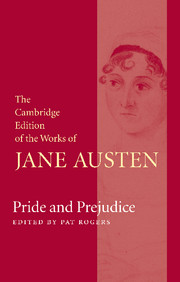Book contents
- Frontmatter
- Contents
- General Editor’s Preface
- Acknowledgements
- Chronology
- Introduction
- Note on the Text
- Pride and Prejudice
- Pride and Prejudice: Volume I
- Pride and Prejudice: Volume II
- Pride and Prejudice: Volume III
- Corrections and Emendations to 1813 text
- Appendix 1 Thomas Egerton and the Publication History
- Appendix 2 Legal and Military Background
- Appendix 3 Pemberley and its Models
- Appendix 4 Note on the second and third editions of Pride and Prejudice
- Abbreviations
- Explanatory Notes
Chapter 19
Published online by Cambridge University Press: 19 December 2020
- Frontmatter
- Contents
- General Editor’s Preface
- Acknowledgements
- Chronology
- Introduction
- Note on the Text
- Pride and Prejudice
- Pride and Prejudice: Volume I
- Pride and Prejudice: Volume II
- Pride and Prejudice: Volume III
- Corrections and Emendations to 1813 text
- Appendix 1 Thomas Egerton and the Publication History
- Appendix 2 Legal and Military Background
- Appendix 3 Pemberley and its Models
- Appendix 4 Note on the second and third editions of Pride and Prejudice
- Abbreviations
- Explanatory Notes
Summary
HAPPY for all her maternal feelings was the day on which Mrs. Bennet got rid of her two most deserving daughters. With what delighted pride she afterwards visited Mrs. Bingley and talked of Mrs. Darcy may be guessed. I wish I could say, for the sake of her family, that the accomplishment of her earnest desire in the establishment of so many of her children, produced so happy an effect as to make her a sensible, amiable, well-informed woman for the rest of her life; though perhaps it was lucky for her husband, who might not have relished domestic felicity in so unusual a form, that she still was occasionally nervous and invariably silly.
Mr. Bennet missed his second daughter exceedingly; his affection for her drew him oftener from home than any thing else could do. He delighted in going to Pemberley, especially when he was least expected.
Mr. Bingley and Jane remained at Nether field only a twelvemonth. So near a vicinity to her mother and Meryton relations was not desirable even to his easy temper, or her affectionate heart. The darling wish of his sisters was then gratified; he bought an estate in a neighbouring county to Derbyshire, and Jane and Elizabeth, in addition to every other source of happiness, were within thirty miles of each other.
Kitty, to her very material advantage, spent the chief of her time with her two elder sisters. In society so superior to what she had generally known, her improvement was great. She was not of so ungovernable a temper as Lydia, and, removed from the influence of Lydia's example, she became, by proper attention and management, less irritable, less ignorant, and less insipid.1 From the farther disadvantage of Lydia's society she was of course carefully kept, and though Mrs. Wickham frequently invited her to come and stay with her, with the promise of balls and young men, her father would never consent to her going.
- Type
- Chapter
- Information
- Pride and Prejudice , pp. 427 - 431Publisher: Cambridge University PressPrint publication year: 2006

